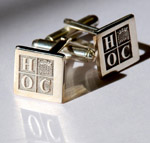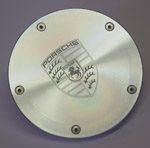11 June 2008
Sheffield Assay Office - out to make a mark...
 For anyone not familiar with the intricacies of hallmarking, it might come as something of a surprise to learn that Sheffield Assay Office, one of only four Assay Office in the country appointed by Act of Parliament to test, assess and hallmark precious metal, is also a leading provider and user of lasermarking technology.
For anyone not familiar with the intricacies of hallmarking, it might come as something of a surprise to learn that Sheffield Assay Office, one of only four Assay Office in the country appointed by Act of Parliament to test, assess and hallmark precious metal, is also a leading provider and user of lasermarking technology.
But when you consider the qualities of hallmarking - accurate,precise, durable,traceable - it becomes clear why contemporary lasermarking can sit comfortably alongside a very traditional craft.
Indeed, as Sheffield Assay Office prepares for a move to new, purpose-built headquarters in July 2008, its lasermarking facility is set to take an even more prominent role.
Assay Master Ashley Carson explains how lasermarking has become an important Assay Office service, and outlines the plans to develop it in the future.
“Sheffield Assay Office has been providing trade and consumer protection in the form of the hallmark since 1773” he says, “but some 235 years later you would expect there to be an option to the traditional method and there is - lasermarking. Lasermarking provides an accurate and effective option to traditional hallmarking because it does not disturb or bruise the precious metal. It is ideal for hollow, finished or intricate jewellery products and we have found it particularly suitable for many of items which now come to us from overseas as finished pieces. It’s equally effective on both flat and curved surfaces and also ideal for large items which can be difficult to hold and position for traditional hallmarking. Indeed, we have had some stunning large, individual pieces in recent months for marking”.
A hallmark created by laser can replicate the qualities of a struck mark, achieving 3-D deep relief at precisely the required size, position and depth. and retaining excellent definition when polished. Alternatively, the Assay Office can use a different type of laser to produce skeletal or outline laser marks, which are more suitable for hollow, semi-finished or intricate jewellery.
The benefits of lasermarking as an alternative to traditional hallmarking are clear to see but the team at Sheffield Assay Office is keen to maximise the potential of their equipment and have developed a range of business opportunities which keep the lasermarking team busy.
 Head of the Lasermarking Jayne Stevens joins in to explain the flexibility of Sheffield Assay Office’s lasermarking facility. “We have an extensive range of laser equipment” she says “and each laser is capable of different things. Lasermarking is an ideal process for clearly and accurately marking a range of logos, signatures, security marks and serial numbers for decorative, promotional or engineering and industrial purposes and we have clients which range from automotive to consumer goods to computer ancillaries. We also have a laser development section that deals with non-production items and a sample marking service.”
Head of the Lasermarking Jayne Stevens joins in to explain the flexibility of Sheffield Assay Office’s lasermarking facility. “We have an extensive range of laser equipment” she says “and each laser is capable of different things. Lasermarking is an ideal process for clearly and accurately marking a range of logos, signatures, security marks and serial numbers for decorative, promotional or engineering and industrial purposes and we have clients which range from automotive to consumer goods to computer ancillaries. We also have a laser development section that deals with non-production items and a sample marking service.”
The range of materials which Sheffield Assay Office can mark is incredibly wide and includes materials as varied as leather, plastic, acrylic, glass, ceramics, aluminium, rubber, stainless steel, slate and wood. Indeed, Sheffield Assay Office was delighted to be commissioned to lasermark the wooden handles of a range of garden tools bearing the Duchy of Cornwall crest. Ideal for the (up)market gardener perhaps!
 They also provide lasermarking for instrument controls and control panels where coatings or laminates can be removed to reveal other layers, often translucent for back-illumination.
They also provide lasermarking for instrument controls and control panels where coatings or laminates can be removed to reveal other layers, often translucent for back-illumination.
Another source of lasermarking business comes from commemorative and promotional items; “We get a lot of commissions for commemorative items” says Ashley Carson. “Things like, for example, personalised silver salvers for retirement gifts. We have a design facility which can develop artwork for lasermarking from something as basic as a rough sketch; we can scan pictures, letterheads or we can take existing artwork and format it for the laser. And we can produce anything from a simple name dedication to a very complex crest.”
Sheffield Assay Office will quote in advance for designing a programme and customers have found that laser marking is very cost effective for one-offs and prototypes, and also ideal for marking small quantities without the need for expensive tooling.
The current range of equipment includes 6 x 100w YAG systems, 4 x 50w YAG diode camera systems and 2 x 25w CO2 systems, but this is set to increase when the Assay Office moves to its new premises.
The team has also been focusing on volume production and the extra space afforded by the move, coupled with the addition of new laser equipment, will see a significant enhancement of the volume lasermarking capability, which is good news for customers with volume marking requirements.
Ashley Carson is delighted with the way in which the lasermarking facility has developed and sees it as a natural partner to traditional hallmarking. So, as Sheffield Assay Office prepares to mark a new stage in its history after 235 years, his plans for the lasermarking facility are clear, “We’re out to make our mark with a service second to none,” he says.
- Contact Information
- Name: Jayne Stevens
- Email: stevensj@assayoffice.co.uk

